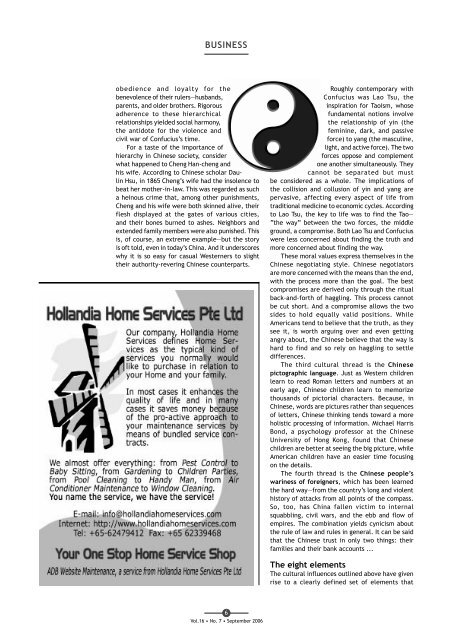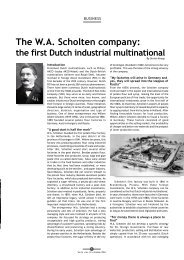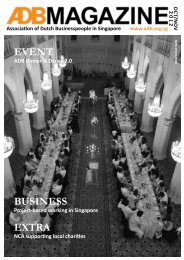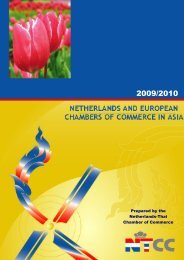Sept06 latest - Association of Dutch Businessmen
Sept06 latest - Association of Dutch Businessmen
Sept06 latest - Association of Dutch Businessmen
Create successful ePaper yourself
Turn your PDF publications into a flip-book with our unique Google optimized e-Paper software.
BUSINESS<br />
obedience and loyalty for the<br />
benevolence <strong>of</strong> their rulers—husbands,<br />
parents, and older brothers. Rigorous<br />
adherence to these hierarchical<br />
relationships yielded social harmony,<br />
the antidote for the violence and<br />
civil war <strong>of</strong> Confucius’s time.<br />
For a taste <strong>of</strong> the importance <strong>of</strong><br />
hierarchy in Chinese society, consider<br />
what happened to Cheng Han-cheng and<br />
his wife. According to Chinese scholar Daulin<br />
Hsu, in 1865 Cheng’s wife had the insolence to<br />
beat her mother-in-law. This was regarded as such<br />
a heinous crime that, among other punishments,<br />
Cheng and his wife were both skinned alive, their<br />
flesh displayed at the gates <strong>of</strong> various cities,<br />
and their bones burned to ashes. Neighbors and<br />
extended family members were also punished. This<br />
is, <strong>of</strong> course, an extreme example—but the story<br />
is <strong>of</strong>t told, even in today’s China. And it underscores<br />
why it is so easy for casual Westerners to slight<br />
their authority-revering Chinese counterparts.<br />
Roughly contemporary with<br />
Confucius was Lao Tsu, the<br />
inspiration for Taoism, whose<br />
fundamental notions involve<br />
the relationship <strong>of</strong> yin (the<br />
feminine, dark, and passive<br />
force) to yang (the masculine,<br />
light, and active force). The two<br />
forces oppose and complement<br />
one another simultaneously. They<br />
cannot be separated but must<br />
be considered as a whole. The implications <strong>of</strong><br />
the collision and collusion <strong>of</strong> yin and yang are<br />
pervasive, affecting every aspect <strong>of</strong> life from<br />
traditional medicine to economic cycles. According<br />
to Lao Tsu, the key to life was to find the Tao—<br />
“the way” between the two forces, the middle<br />
ground, a compromise. Both Lao Tsu and Confucius<br />
were less concerned about finding the truth and<br />
more concerned about finding the way.<br />
These moral values express themselves in the<br />
Chinese negotiating style. Chinese negotiators<br />
are more concerned with the means than the end,<br />
with the process more than the goal. The best<br />
compromises are derived only through the ritual<br />
back-and-forth <strong>of</strong> haggling. This process cannot<br />
be cut short. And a compromise allows the two<br />
sides to hold equally valid positions. While<br />
Americans tend to believe that the truth, as they<br />
see it, is worth arguing over and even getting<br />
angry about, the Chinese believe that the way is<br />
hard to find and so rely on haggling to settle<br />
differences.<br />
The third cultural thread is the Chinese<br />
pictographic language. Just as Western children<br />
learn to read Roman letters and numbers at an<br />
early age, Chinese children learn to memorize<br />
thousands <strong>of</strong> pictorial characters. Because, in<br />
Chinese, words are pictures rather than sequences<br />
<strong>of</strong> letters, Chinese thinking tends toward a more<br />
holistic processing <strong>of</strong> information. Michael Harris<br />
Bond, a psychology pr<strong>of</strong>essor at the Chinese<br />
University <strong>of</strong> Hong Kong, found that Chinese<br />
children are better at seeing the big picture, while<br />
American children have an easier time focusing<br />
on the details.<br />
The fourth thread is the Chinese people’s<br />
wariness <strong>of</strong> foreigners, which has been learned<br />
the hard way—from the country’s long and violent<br />
history <strong>of</strong> attacks from all points <strong>of</strong> the compass.<br />
So, too, has China fallen victim to internal<br />
squabbling, civil wars, and the ebb and flow <strong>of</strong><br />
empires. The combination yields cynicism about<br />
the rule <strong>of</strong> law and rules in general. It can be said<br />
that the Chinese trust in only two things: their<br />
families and their bank accounts ...<br />
The eight elements<br />
The cultural influences outlined above have given<br />
rise to a clearly defined set <strong>of</strong> elements that<br />
6<br />
Vol.16 • No. 7 • September 2006
















